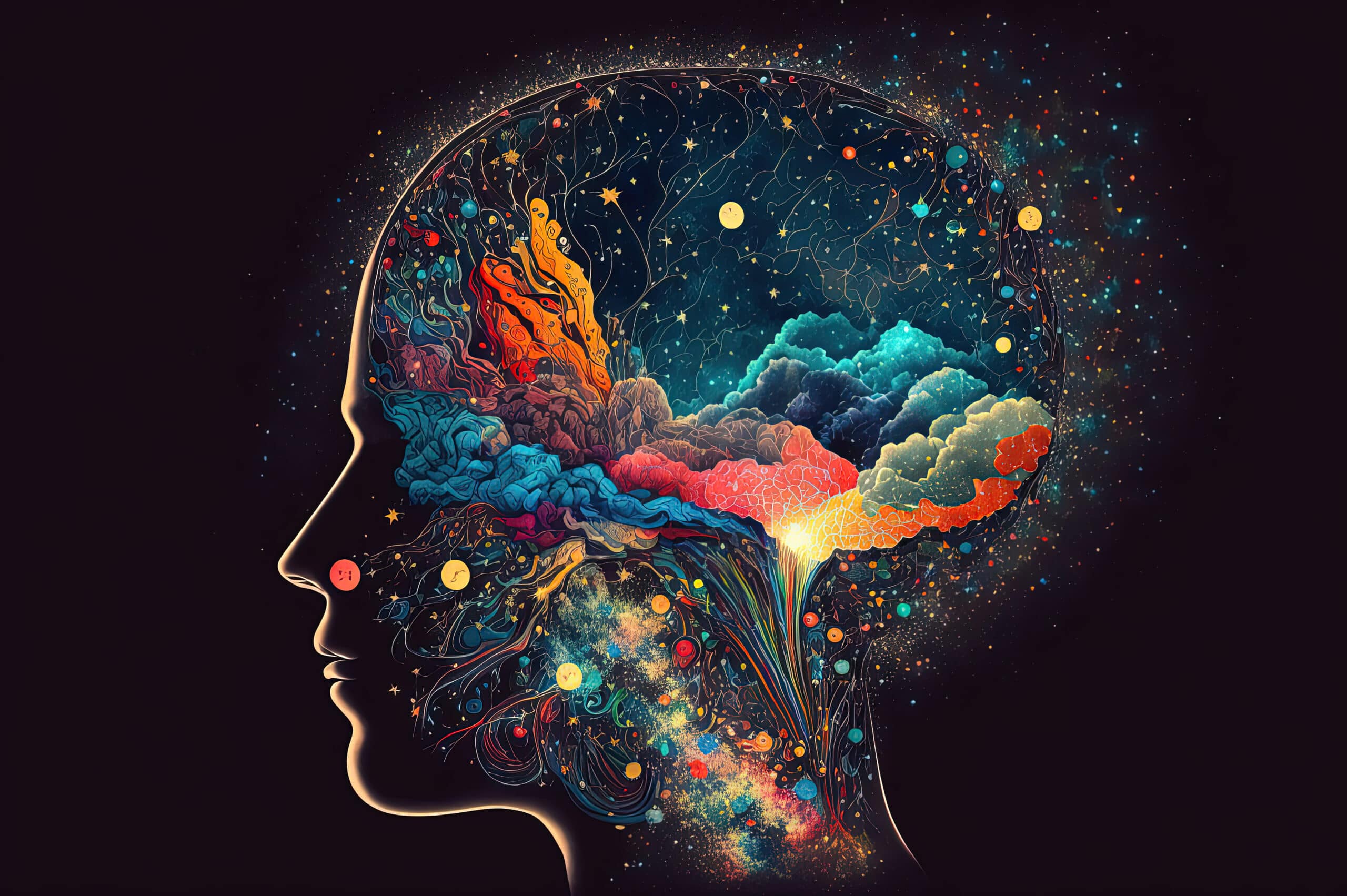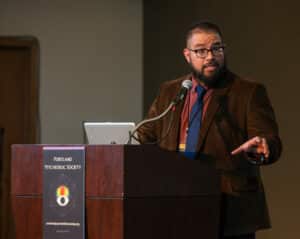By Meghan McCarthy

Psychedelics are more than recreational drugs with a questionable reputation.
Psychedelics – drugs that alter the mind – are being tested throughout the country for their medicinal use, including early investigations of psychedelics as an intervention for Alzheimer’s disease and related dementias (ADRDs).
Albert Garcia-Romeu, PhD, and Paul B. Rosenberg, MD, researchers at Johns Hopkins, are investigating if psychedelics can help people living with ADRDs cope with their condition.
What are psychedelics?
Psychedelics are psychoactive substances, meaning they impact users’ minds. They can affect mood, perception, and sensory or social experiences.
Research suggests that psychedelic effects are caused by stimulating serotonin receptors in the brain.
There are many kinds of psychedelics. The most common types include:
- Lysergic acid diethylamide (LSD)
- Dimethyltrypatamine (DMT)
- Mescaline
- Ecstasy
- Psilocybin
Psilocybin, which is found in about 200 species of mushrooms, has recently shown good promise as a potential treatment for depression and addictions. Oregon recently decriminalized psilocybin for therapeutic use in 2022. Now, nine states have decriminalized it in at least some locations. However, psilocybin and other psychedelics remain illegal at the Federal level across all 50 states and are still being studied as experimental therapies.
How do psychedelics apply to Alzheimer’s disease and related dementias (ADRDs)?
Currently, researchers around the country are studying whether psychedelics can be used to treat neuropsychiatric diseases, including ADRDs.
The therapeutic effects of psychedelics for ADRDs remain unproven, but researchers believe psychedelics could impact neurological causes of ADRDs or associated psychiatric symptoms.
Let’s consider the latter possibility.
Approximately 40% of patients with Alzheimer’s have anxiety. However, recent studies suggest that anti-anxiety and depression treatments, such as SSRI medications or talk therapy, are less effective in individuals with dementia.

Albert Garcia-Romeu
Alternative therapies, such as psychedelics, could prove useful for individuals living with ADRDs.
Drs. Garcia-Romeu and Rosenberg conduct clinical research at the Center for Psychedelic & Consciousness Research at Johns Hopkins University.
For over 20 years, researchers at Johns Hopkins have studied the psychological impact of psilocybin in individuals with conditions like cancer, major depression, and anorexia.
They found, for example, that cancer patients who were administered psilocybin reported a large decrease in depression and anxiety. Over 80% of patients reported increased life satisfaction.
Their most recent work studies the effect of psilocybin in patients with mild cognitive impairment (MCI) and Alzheimer’s disease.
“In some patient populations, psilocybin is very helpful in reducing depression, reducing anxiety, and improving quality of life,” said Dr. Garcia-Romeu. “Those types of benefits could be really useful in a population with Alzheimer’s.”
The patient experience
Imagine you are a participant in Dr. Garcia-Romeu’s study. You’ve just been diagnosed with MCI or an early-stage ADRDs.
Your participation would start with a rigorous screening process: specifically, a six-hour session that involves a physical exam, blood draw, EKG, and intensive mental health history. If you qualify, your baseline psychosocial symptoms, such as anxiety and depression, would be measured through a series of cognitive tests.
The second study phase is preparation.
For three to four weeks, you’d meet weekly with study facilitators and undergo preparatory counseling.
Think of your most important relationships. Previous traumas. Your worldview, religion, or spiritual beliefs. Symptom burden. These are all important aspects that comprise who you are. Facilitators aim to learn about these formative life events in counseling sessions before psilocybin dosing occurs.
“This process is about building a working alliance, which is a therapeutic process of getting comfortable and building trust with your facilitator,” said Dr. Garcia-Romeu. “We also learn about what they would like to get out of the experience, so there’s intention setting built into this phase.”

Therapy room, photo courtesy of Johns Hopkins Medicine
Next, you’d move into the phase when you receive psilocybin.
You’d arrive at around 8:30 in the morning for your first dosing session. Specifically, you’d be given a small (roughly 15mg) dose of psilocybin in a capsule. If you respond well, you could move on to a higher (roughly 25mg) dose in a second session.
This is a safety measure to ensures that the psilocybin doesn’t cause unwanted side effects like disorientation.
Now, let your imagination go wild. Once dosed, your experience would be unique.
“Sessions are always going to be different,” said Dr. Garcia-Romeu. “The effect is a function of the dose, but also a function of what is going on with a person physically and psychologically that day.”
Common classes of experiences that may arise include:
- Autobiographical memories
- Seeing shapes and colors
- Visualizing imaginary environments, such as being underwater or in space
- Body-based somatic awareness, such as being very aware of breathing
- Strong emotional reactions, ranging from paranoia and panic, to gratitude or love
- Mystical and spiritual experiences, where individuals feel they are interacting with a higher power
Throughout these sessions, facilitators stay with participants and help guide experiences if they become challenging. They also take special care in reminding ADRD and MCI participants of where they are and what they’re doing.
“We call these negative emotional reactions challenging experiences,” said Dr. Garcia-Romeu. “They can be very difficult for people because they feel really frightened, scared, or out of control. This doesn’t usually last for the whole session, but it can. This is why we spend a lot of time preparing beforehand.”
Some people also report feeling that this is a spiritual experience.
“They may feel one with the universe,” said Dr. Garcia-Romeu. “It involves an ego dissolution, meaning your normal self of self-disintegrates and instead you feel part of a larger unified field.”
People often feel their experiences can open up new insights into their lives and problems.
Eight hours later, the psilocybin effects wear off and you’re free to go home.
Afterwards, the final phase of the study, known as integration, seeks to create an understanding of the psychedelic experience and its potential impact.
“We work on building and taking away any lessons or interesting insights from the sessions,” said Dr. Garcia-Romeu. “We try to weave that into their day-to-day lives so that their experience can be useful for a long time.”
The overall process takes 2-3 months. You’d then be followed for six months to measure your psychosocial symptoms and quality of life.
The future remains uncertain
In other studies, psilocybin interventions have led to an ongoing reduction in anxiety that can last months to years.
However, little is known about the long-term impact of psilocybin on patients with MCI or ADRDs.
“We’re testing these types of interventions for safety and effectiveness,” said Dr. Garcia-Romeu. “This isn’t a wonder drug. There are many elements we still don’t understand.”
Even if the interventions prove beneficial, there are many practical challenges to this research.
Currently, psychedelics are not FDA approved treatments, and they remain illegal across the US except in experimental studies like this. The Hopkins team is conducting the first study of this kind in people with ADRDs, making this intervention primarily unavailable to the public.
Beyond legal considerations, there are many ethical concerns that would rise from the use of psychedelics in research.
Penn Memory Center (PMC) researchers recently published a paper that highlights potential benefits and challenges to psychedelic research.
Main concerns include:
- The impact of psychedelics on autonomy and consent of “ego dissolution” on persons living with dementia
- How psychedelics might impact caregiving
“There is great promise for psychedelic-assisted psychotherapy,” said Andrew Peterson, PhD, who is a collaborator of the PMC and an assistant professor of philosophy at George Mason University. “But we shouldn’t let hype outpace sound and ethical science.”
To learn more about Garcia-Romeu and Rosenberg’s research, please click here.
(Please note, their research is not open to new participants at this time.)